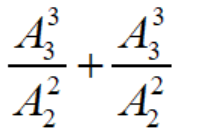数论——算数基本定理 - HDU 4497 GCD and LCM
GCD and LCM
Time Limit: 2000/1000 MS (Java/Others) Memory Limit: 65535/65535 K (Java/Others)
Total Submission(s): 3379 Accepted Submission(s): 1482
Note, gcd(x, y, z) means the greatest common divisor of x, y and z, while lcm(x, y, z) means the least common multiple of x, y and z.
Note 2, (1, 2, 3) and (1, 3, 2) are two different solutions.
The next T lines, each contains two positive 32-bit signed integers, G and L.
It’s guaranteed that each answer will fit in a 32-bit signed integer.
gcd(x,y,z) == G, lcm(x,y,z) == L
x' = x /G,y' = y /G ,z' = z / G; gcd( x', y',z') == 1,lcm(x',y',z') == L/G
这样的话对t = L/G 这个数进行素因子分解,t = p1^t1 * p2^t2 * p3^t3 ..... * pn ^tn;
满足上面条件的x,y,z一定为这样的形式。
x' = p1^i1 * p2^i2 *```* pn^in.
y' = p1^j1 * p2^j2 * ```*pn^jn.
z' = p1^k1 * p2^k2 * ```*pn^kn.
为了满足上面的条件,对于p1,一定有max(i1,j1,k1) = t1和min(i1,j1,k1) =0;
因为gcd(p1^i1,p1^j1,p1^k1)== 1 → min(i1,j1,k1) == 0;lcm(p1^i1,p1^j1,p1^k1) == p1^t1 => max(i1,j1,k1) == t1;
所以我们现在要做的是把L/G分解成n个素因数相乘,比如:28=2*2*7=2^2 * 7
对于每一个p来说,三个数的集合一定是{ 0, t, x | 0≤x≤t }
- x = 0 或 x = t:这种情况有
 = 6 种
= 6 种 - 0 < x < t:这种情况x的取值可以为 0~t 的整数,一共有 t-1 个,而每一个数,都可以有
 种排列方法,就是6*(t-1)
种排列方法,就是6*(t-1)
所以对每一个P来说,最后一共有 6*t 种取法 。
举个例子:252=2*2*7=2^2 * 3^3 * 7 一共有6*2+6*3+6=36种不同的(x,y,z)序列。
而如果L%G!=0,自然就没有解
#include <iostream> using namespace std; int f1(int n) { int res = 1, i = 2; while (n > 1) { int t = 0; if(n%i==0){ while (n%i == 0) { t++; n /= i; } res *= 6 * t; } i++; } return res; } int main() { int T; cin >> T; while (T--) { int G, L; cin >> G >> L; if (L%G != 0) cout << 0 << endl; else cout << f1(L / G) << endl; } return 0; }

